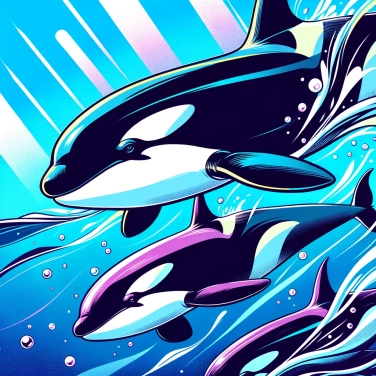In detail, for those interested!
The physical characteristics of orcas
Orcas, also known by their scientific name Orcinus Orca, are marine mammals belonging to the cetacean family. Their elegant and powerful silhouette distinguishes them from other species of dolphins. Orcas are easily recognizable by their streamlined body, their characteristic black and white coloring, and their large size. In fact, orcas can measure up to 9 meters in length and weigh up to 5 tons, depending on their sex and subspecies.
Their massive head houses a particularly developed brain, making them one of the most intelligent marine animals. Their tall and straight dorsal fin can measure up to 1.8 meters in males and is a distinctive feature of this species. Orcas also have large and rounded pectoral fins, ideal for propulsion and maneuvering in the water.
Their black coloration on the back and white on the belly, called "dichromatism," is an effective camouflage during hunting, as it helps to conceal their silhouette from above and below. Additionally, orcas have a robust jaw with conical and sharp teeth, which can reach up to 10 centimeters in length in adult individuals, making them formidable marine predators.
Orcas are remarkable creatures, adapted to life in the oceans worldwide.
The origin of the term "killer whale"
The origin of the term "killer whale" dates back to the Middle Ages, when European sailors discovered these large marine predators. The term "killer whale" is a French translation of the Spanish term "esparbarda", itself derived from the Latin "esparvare" meaning "to crush". This name refers to the strength and aggressiveness of these formidable cetaceans. Thus, the term "killer whale" has become a commonly used name to refer to the orca, one of the most feared and respected marine predators today.
The behavioral characteristics of orcas.
Orcas are marine creatures with complex social behaviors. They live in family groups called pods, composed of several individuals. Each pod is led by a mature female, also known as the matriarch, who guides the group's activities.
Orcas communicate with each other using a variety of vocalizations, including whistles, clicks, and squeaks. This sophisticated communication ability allows them to coordinate their actions during hunting, reproduction, and protecting the young.
These marine predators are known for their strategic hunting behavior. They cooperate in groups to capture prey such as fish, seals, or even whales. Orcas can also use unique hunting techniques, such as "karate": by hitting their prey with their tails, they can stun or kill them.
Orcas are also very intelligent and curious animals. They have been observed playing, jumping out of the water, and even surfing in the waves generated by boats. These playful behaviors suggest a form of social play and learning within orca groups.
In captivity, orcas have shown behaviors that are incompatible with their wild nature, such as aggression towards humans or other orcas. This highlights the importance of preserving their natural habitat and better understanding their behaviors in the wild.
The similarities between killer whales and orcas
Orcas and killer whales are actually the same species. The term "killer whale" is simply another name for the orca. Both names refer to the same marine mammal, known scientifically as Orcinus orca. This is one of the many similarities between these two names.
These cetaceans are known for their exceptional intelligence and sophisticated communication abilities. They belong to the dolphin family, which means they are related to dolphins. Orcas and killer whales share many physiological and behavioral characteristics with other members of this family.
In addition to similarities in their anatomy and complex social behavior, orcas and killer whales also share similarities in their diet. They are formidable predators that mainly feed on fish, cephalopods, and sometimes even marine mammals. Their status as top predators makes them essential animals in the marine ecosystem.
In conclusion, the similarities between orcas and killer whales go far beyond just their name. These magnificent marine creatures share physical, behavioral, and ecological characteristics that make them unique and essential to the health of the oceans.
![Explain why some countries change time zones?]()
![Explain why Alexander the Great refused to wear shoes.]()
![Explain why Alexander the Great always wore an impressive helmet.]()
![Explain why the last Chinese emperor was so young when he came to power?]()





















